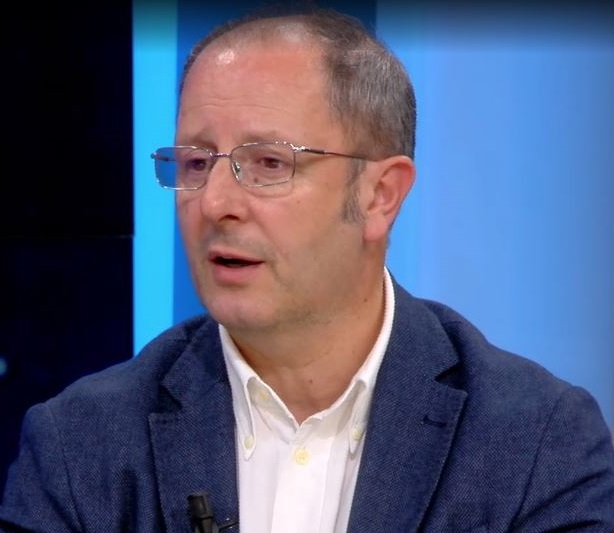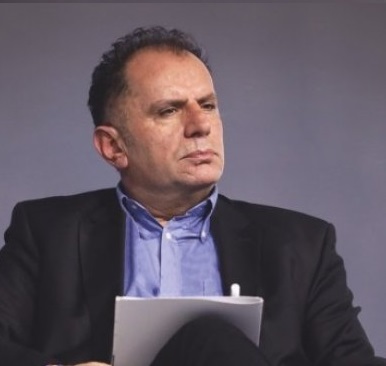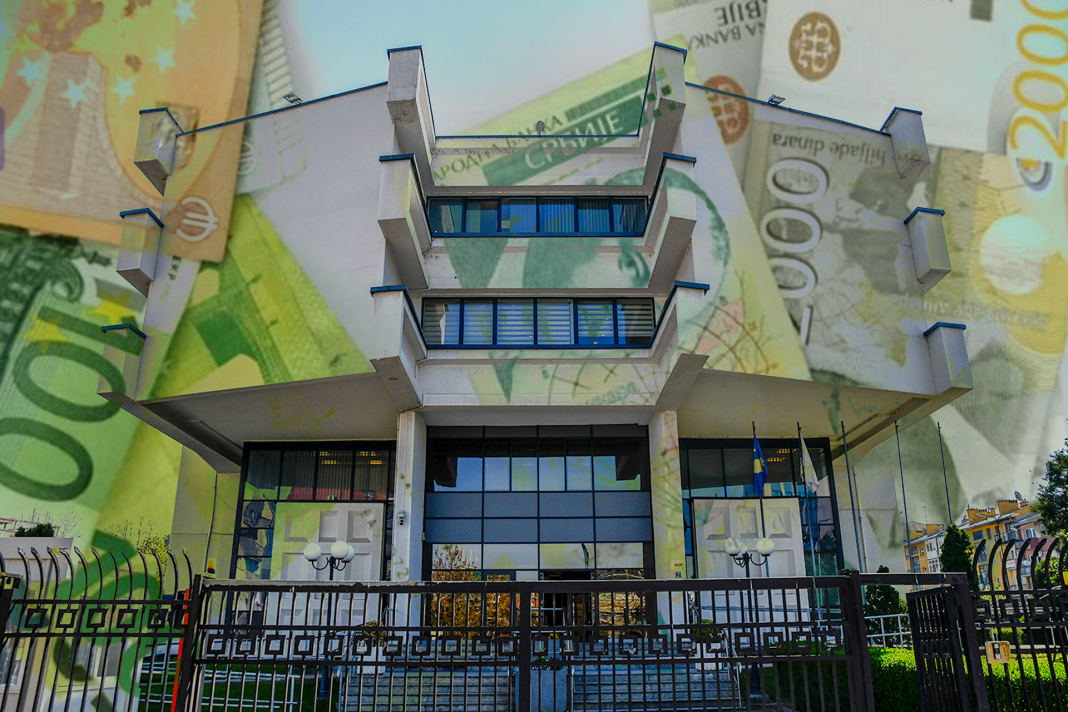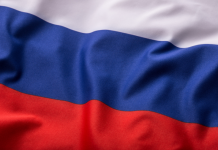For the past three weeks, the ban on the dinar in Kosovo has been the central issue in the clash between Serbia and Kosovo. The catalyst was the regulation issued by the Central Bank of Kosovo, which solidifies the euro as the sole legal currency. Despite being in accordance with Kosovo’s Constitution and Laws, the current practice of using the dinar in Serbian-majority Municipalities has prompted the international community to seek the decision’s suspension, aiming to implement a transitional period for adjustment. Experts explain to Faktoje the real implications of the Central Bank of Kosovo’s decision for Serbs living in Kosovo and for the state of Kosovo itself.
Jona Plumbi
Since the end of the war, in Kosovo’s Serbian-majority municipalities, residents have been paid and have conducted transactions in dinars. Euros are also used, but one currency has not been excluded by the other for at least 22 years in these communities.
This practice was called into question on January 17, 2024. On that day, the Central Bank of Kosovo (CBK) published a regulation stating that the only permitted currency for cash transactions and in the payment system in the Republic of Kosovo is the Euro. According to the Regulation, non-euro currencies can only be saved in bank accounts and can be used for international payments and exchange. Exchange can only be done through institutions licensed by the Central Bank of Kosovo for this purpose. As a result of the decision, the use of the dinar is also prohibited in Kosovo.
The regulation came into force on February 1, 2024.
Currency history in Kosovo
After the end of the war in Kosovo, the United Nations Mission in Kosovo UNMIK decided in September 1999 to introduce the German mark and other foreign currencies for use in Kosovo. The reason was the existence of considerable amounts of the German mark, which was the most widely used currency before the war, and the fact that the population was familiar with this currency.
In 2002, UNMIK and the European Union entrusted the Central Bank of Kosovo (back then BPK) with the task of replacing the currency with the Euro in cooperation with the European Central Bank. Although not part of the Eurozone, Kosovo has legally declared Euro as its sole official currency. The Constitution of Kosovo in 2008 stipulated ‘the use of a single currency as a valid means of payment’ (Article 11).
How did the dinar operate in Kosovo
Despite the Laws in force, Kosovo has been aware of the operation of a parallel system, through which Serbia pays Serbs in Kosovo in Dinars. Serbia sends dinars to the Central Bank of Serbia, via land routes, through the British company Henderson, which operates a vault in Leposavić. Geron Kamberi, a Researcher at the Center for the Study of Democracy and Governance, refers to this payment method as a ‘silent agreement’ that has been in operation for 22 years.
‘Serbia uses this channel to pay 31,831 employed members of the Serbian minority in northern Kosovo for their contributions to healthcare, education, and various public services; Additionally, it supports 29,115 pensioners, with 4,700 receiving pensions in cash at branches of the National Bank of Serbia. Furthermore, through this fund, Serbia provides payment to 31,586 Serbian residents who are recipients of social assistance.’ — Geron Kamberi

‘Dinar prohibition in Kosovo — an Unnecessary Rush’
The regulation of the Central Bank of Kosovo and its enforcement, which started two weeks after its announcement, triggered significant reactions. Serbia accused Kosovo of ‘ethnic cleansing without use of firearms.’ The decision raised concerns for both the European Union and the United States of America.
The European Commission expressed regret over the approval of the decision without prior consultation, highlighting the potential effect the dinar ban in Kosovo could have on the daily lives of Serbs in Kosovo, particularly in schools and hospitals. The EU sought to ensure that the transitional phase of implementing the decision allowed ample time for citizens and institutions to adapt.
The United States, France, Germany, Italy, and the United Kingdom, members of the QUINT organization, have collectively called for a postponement in implementation to ensure a necessary transition period for adaptation. Selami Xhepa, Expert in Economic Affairs at the University of Tirana, has similarly criticized the decision as ‘rushed and unjust.’
‘Decisions of such an economic nature are not made with immediate effect, meaning that the law is issued today and enters into force today. This is an economic phenomenon that has a lasting impact due to its history, and therefore, such decisions, even if made for political reasons, should have a long transition phase for the replacement of the currency.‘ — Selami Xhepa.

The impact of banning the dinar in Kosovo for its citizens
Experts view the concern of Serbian citizens in Kosovo about their inability to receive salaries or pensions from Serbia as a technical issue that can be addressed through the banking system. The Expert, Geron Kamberi, emphasizes that the barrier created is more of a psychological nature, serving as a transitional phase for the adaptation of the Serbian community residents to this new payment method.
‘Serbian families in northern Kosovo have the privilege of having two active bank accounts. There are 43,000 active accounts where money is transferred from the budget of Kosovo to Euros. On the other hand, there are four branches of second-tier banks operating in the Municipalities of the Northern Kosovo. There are also branches of 15 non-bank financial institutions (such as Western Union) where Euro payments can be sent from the Republic of Serbia to Serbian minority citizens living in these areas.‘ argues Geron Kamberi.
Arbër Zaimi, Member of Vetëvendosje Leadership, sees no issue with the continuation of pension, salary, or assistance payments. Serbia can send money to Kosovo through transfers to various banks in Kosovo without having to violate the law.
‘What is being prevented [with this regulation] is the smuggling of cash into Republic of Kosovo. Earlier, billions of dinars were illegally brought into Kosovo via vehicles and vans. These money have been used for cash payments. Some of them might have been pensions and social assistance, but certainly, a portion of them was ‘subsidization’ for recruitment and arming for violent and criminal activities culminating in the terrorist attack of September 24th.’ — Arbër Zaimi.

Kosovo’s Deputy Prime Minister, Besnik Bislimi, stated one day prior to the enforcement of the BQK regulation that ‘commercial banks operating in Kosovo have been instructed to establish new branches in the four Northern Municipalities of the country, and the Central Bank also requires them to provide basic current accounts without any fees for their holders’.
Nevertheless, the Economic Expert Selami Xhepa considers the problematic impact on citizens due to the short timeframe for enforcing this new regulation. ‘There could be implications in the exchange process. People may fear that they will lose a portion of their savings due to exchange. Considering our lack of knowledge about the exchange process, enforcing a law with such sudden force of action is not advisable. A transition period is needed, during which people have the opportunity to decide on the exchange of their deposits from one currency to another at a rate that is suitable for their economic interests.’- Selami Xhepa for Faktoje.
Economic decision — political manipulation
Despite the decision having economic implications and being deemed lawful by Kosovo’s international partners, it is being politically exploited by Serbia. Former Chairman of the Economic Chamber of Kosovo, Safet Gërxhaliu, considers this as an inevitable cost of the abnormal relationship between Kosovo and Serbia. He points out that Kosovo has borne greater damage from this decision of the Central Bank of Kosovo than the Serbs in Kosovo.
‘This topic has been brought into focus, politicized, and internationalized, and the fact that we are witnessing strong reactions from Brussels, particularly from the EU, is detrimental to Kosovo. When considering that this happened while Kosovo is under EU measures or sanctions, I genuinely believe that the decision by the Central Bank of Kosovo is a misstep in Kosovo’s actions. Apart from other negative consequences, it will further prolong the sanctions against Kosovo.’ – Safet Gërxhaliu.

Arbër Zaimi of Vetëvendosje views the success of the decision differently, assessing it by the ultimate outcome rather than the hurdles faced along the journey.
‘Similarly, to the case of license plates, which was an agreement reached over a decade ago, the law on the legal currency in Kosovo has been in place since the Declaration of Independence. Serbia fostered a similarly conflictual atmosphere and a fog of misinformation about the license plates, but after three years, here we are; Kosovo’s plates were compelled to be recognized, and this is advantageous for everyone. Similarly, regarding Kosovo’s financial order, Serbia will be compelled to recognize and implement it. I hope as soon as possible, without unnecessary disturbances and futile delays.’ – Zaimi assesses.
Safet Gërxhaliu doesn’t see any problem with Serbs in Kosovo receiving their salaries in Euro. The problem, – he says, lies elsewhere.
‘It should be understood that Kosovo lacks the diplomatic, political, or economic strength to withstand European and American pressure. It needs to be understood that Kosovo is a product of international diplomacy, and coordination and alignment of actions with international allies are crucial. This implies that in the worst-case scenario, firstly, there will certainly be an extension of implementation. Secondly, the report from the Central Bank alerts that this issue will become part of the dialogue in Brussels. And thirdly, a compromise must be found, as with energy and license plates, ultimately resulting in Kosovo being damaged and losing once again.‘ – Gërxhaliu argues for Faktoje.
Conclusion
The Government of the Republic of Kosovo has pledged that ‘the transitional period will ensure that citizens adapt to the new reality as quickly, smoothly, and harmlessly as possible, investing more in informing and educating businesses and citizens rather than punitive measures’. The Ministry of Trade and Industry has announced that the Business Registration Agency will begin operating in all four municipalities in Northern Kosovo, enabling Serbian businesses there to register and fulfill tax obligations.
Legally, the decision of the Central Bank of Kosovo is widely accepted. Opinions are divided on the way of its implementation. While Serbia exploits the confusion created to fuel its narrative of ‘ethnic cleansing’ of Serbs from Kosovo, the latter has so far refused to suspend the decision. In this scenario, experts perceive different results. On one side, there is the Prime Minister of Kosovo and his legitimate right – even though rushed according to experts – to implement the economic and financial rules of the state of Kosovo. On the other side, there is the Serbian community in Kosovo, caught between two fires: the already implemented decision of the Central Bank of Kosovo and the confusion fueled by the Serbian narrative imported from Belgrade.











